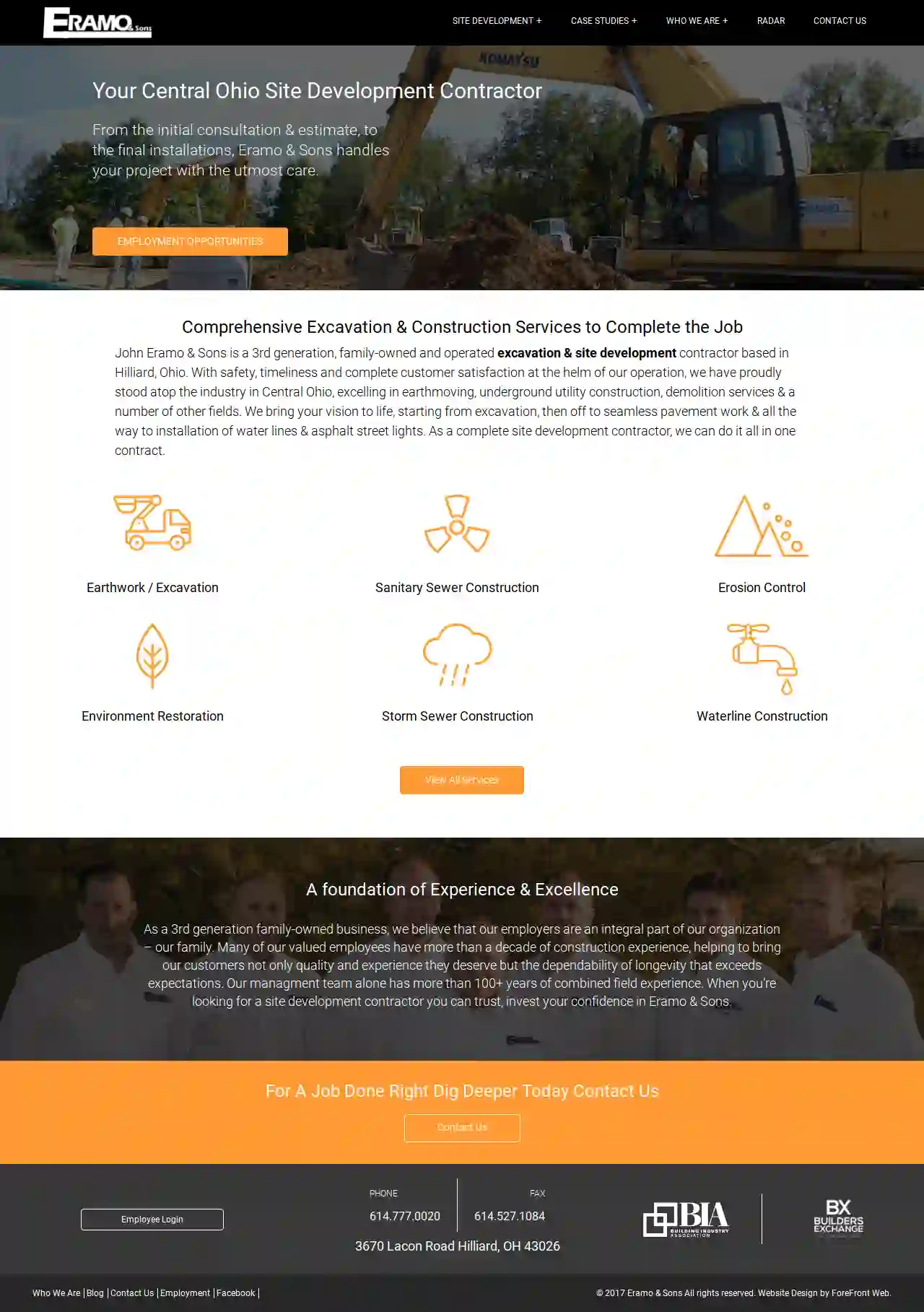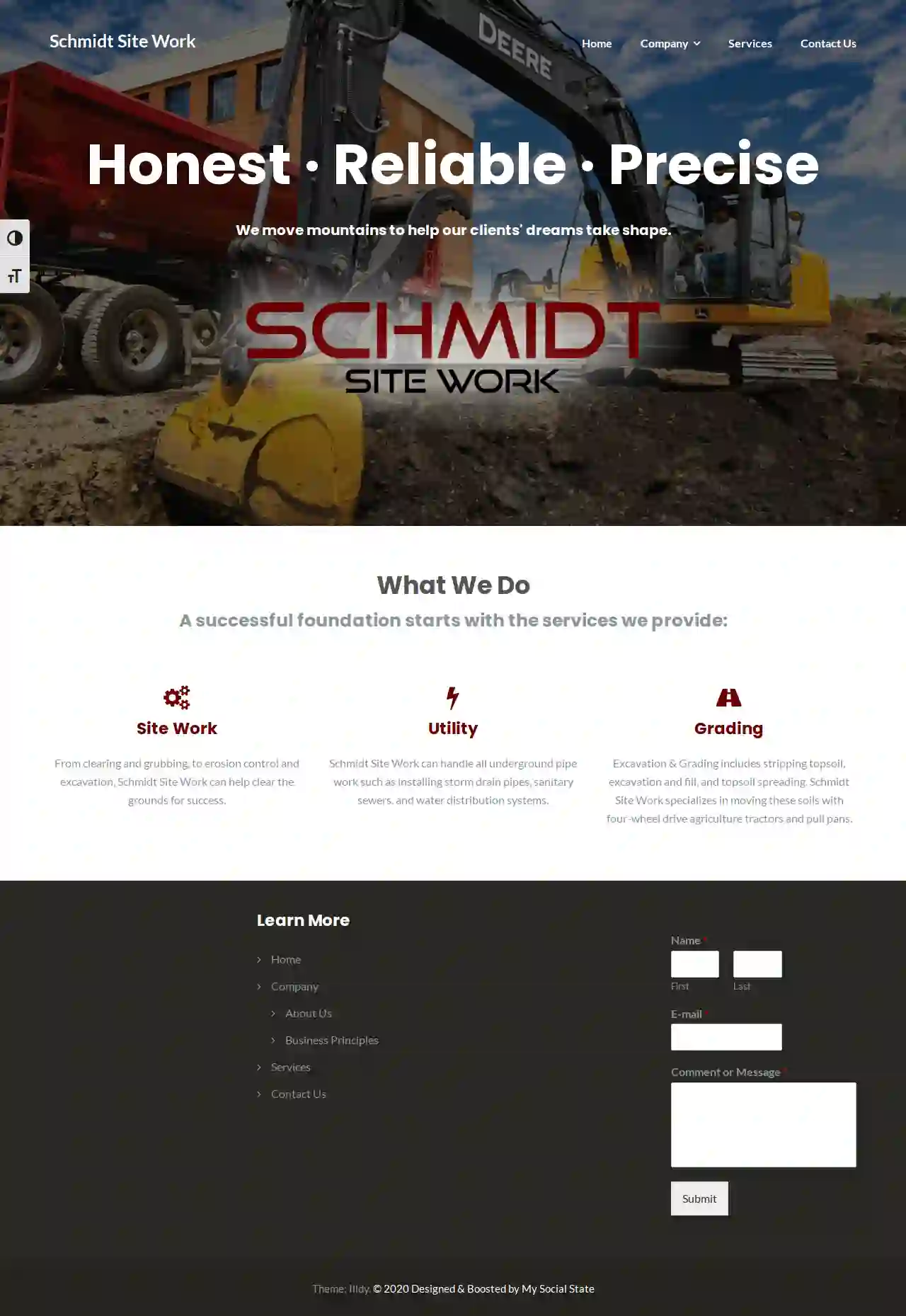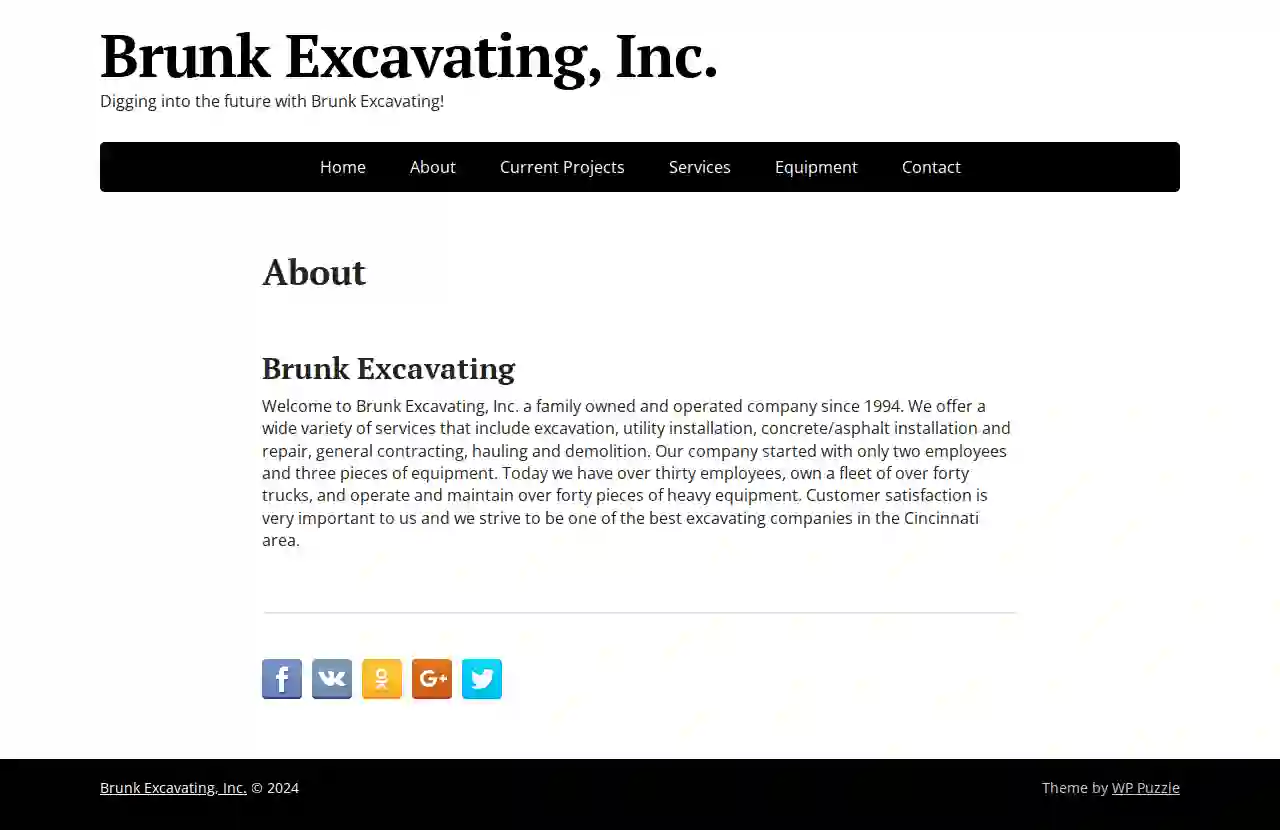Demolition Contractors Austell
Top Demo Contractor in Austell
Get up to 3 Demolition Contractor quotes for your project today! Compare profiles, reviews, accreditations, portfolio, etc... and choose the best deal.

John Eramo & Sons, Inc.
4.26 reviews3670 Lacon Road, Hilliard, 43026, USYour Central Ohio Site Development Contractor From the initial consultation & estimate, to the final installations, Eramo & Sons handles your project with the utmost care. Comprehensive Excavation & Construction Services to Complete the Job John Eramo & Sons is a 3rd generation, family-owned and operated excavation & site development contractor based in Hilliard, Ohio. With safety, timeliness and complete customer satisfaction at the helm of our operation, we have proudly stood atop the industry in Central Ohio, excelling in earthmoving, underground utility construction, demolition services & a number of other fields. We bring your vision to life, starting from excavation, then off to seamless pavement work & all the way to installation of water lines & asphalt street lights. As a complete site development contractor, we can do it all in one contract. A foundation of Experience & Excellence As a 3rd generation family-owned business, we believe that our employers are an integral part of our organization – our family. Many of our valued employees have more than a decade of construction experience, helping to bring our customers not only quality and experience they deserve but the dependability of longevity that exceeds expectations. Our managment team alone has more than 100+ years of combined field experience. When you’re looking for a site development contractor you can trust, invest your confidence in Eramo & Sons.
- Services
- Why Us?
- Gallery
Get Quote
Coastal Grading & Rental Inc
46 reviews1245 Sand Hill Rd, Guyton, GA, 31312, USTo Our Customer's Coastal Grading is committed to providing the highest quality, value-added site preparation services to our coastal Georgia and South Carolina customers. We believe that by creating a successful partnership with our customers throughout the project process, we can exceed their expectations and gain their trust. We pledge to do this through the exceptional performance of every member of the Coastal Grading team. The Short Version Of Our Story Founded in 1981 by Gerald Odom, Coastal Grading began with a modest start. After 10+ years working as a foreman with local asphalt paving companies, Gerald start Coastal Grading and Rental with a pickup truck, a backhoe and a trailer. Gerald’s hard work and integrity paid off quickly growing the company to one of the most highly respected site-work contractors in the Low Country. It became a common theme in the Savannah Market that “no one could out work Gerald Odom”. His dedication set the bar for everyone that joined the Coastal Grading Team. Coastal Grading has provided a wide variety of site-work services throughout the Low Country over the past 40+ year; everything from truck yard maintenance to large warehouse construction. Colonial Terminals yard maintenance, SCAD Ronald C. Waranch Equestrian Center, Ellis Square and Underground Parking Garage, SCAD’s Sands at One West Victory, Benedictine Military School Parade Ground, are only a few of the successful projects of Coastal Grading’s long esteemed history. Gerald’s most successful achievement was building the best commercial grading team in the Savannah Market. After over 50 years in the commercial construction business, Gerald Odom turned over the reigns to Brian Hussey. A well-known, well-respected local businessman, whose father was Roy Hussey, founder of Hussey-Gay-Bell Engineering firm. Brian came “full circle” from holding a survey rod during summer jobs with Hussey-Gay-Bell to owning a civil construction company. It is well known in the commercial construction arena in the Low Country, if you want it done right, hire Coastal Grading. Get To Know Our Team After 40 years of successful leadership in the Site Preparation Industry, Gerald Odum has “passed the torch” to Brian and CG Partnership LLC. Brian brings a unique combination of talents and experiences to his role as the new leader of Coastal Grading including organizational and financial expertise, a strong work ethic, and a commitment to customer satisfaction. Brian is a proven leader with a passion for the construction industry and a deep understanding of the needs of our customers.
- Services
- Why Us?
- Our Team
- Testimonials
- Gallery
Get Quote
Usry's Farm LLC
3.869 reviewsAugusta, USWelcome to Usry's Farm Where we believe in more than just moving earth; we’re here to build relationships and communities. Nestled in the heart of Graniteville, South Carolina, our family-owned and operated company stands as a beacon of dedication, quality, and trust in the excavation and land management industry. Our Journey Founded on a passion for the great outdoors and a commitment to excellence, Usry’s Farm has grown from a humble beginning into a name synonymous with reliability and precision. At the core of our success is a simple philosophy: treat every project as if it were our own. This means every detail matters, every client is family, and every job is a testament to our unwavering commitment to quality. What Sets Us Apart In a world where businesses often prioritize profit over people, Usry’s Farm takes a different route. Our founder, Brock Usry, ensures he’s personally involved in every project, bringing a level of care and attention that’s rare in today’s fast-paced world. It’s not just about being locally owned and family-operated; it’s about being a part of the community we serve. Our team is our family, and we extend that family feeling to our clients. We believe in transparent communication, honest advice, and delivering on our promises. When you choose Usry’s Farm, you’re not just getting a service provider – you’re getting a partner who’s invested in your success.
- Services
- Why Us?
- Gallery
Get Quote
Chafin Southeastern Construction, Inc.
53 reviewsWashington, USChafin Southeastern Construction Chafin Southeastern Construction provides superior civil sitework to customers all over the southeast. Based out of Washington, GA, Chafin Southeastern offers services including clearing & grading, demolition, erosion control, earth excavation, storm drainage installation, water distribution installation, sewer installation, graded stone placement, aggregate base installation, rip rap stone installation, driveway installation, and storm cleanup. Chafin Southeastern Construction strives to provide services with incomparable dedication, integrity, and quality while building lasting relationships with our customers. Our mission is to provide exceptional construction services while upholding these core values: dedication, integrity, and quality.
- Services
- Why Us?
- Gallery
Get Quote
Schmidt Site Work
53 reviewsAugusta, USSchmidt Site Work's mission is to provide the highest-quality workmanship possible in the Augusta Georgia area. We succeed at this because of the integrity of our staff and subcontractors, our commitment to a solid work ethic, and our passion for staying current with the newest innovations of our industry, with consideration for the environment.
- Services
- Why Us?
- Gallery
Get Quote
Southern Land Improvements
Edgefield County, USSouthern Land Improvements With expertise in excavating and land improvements, Southern Land Improvements offers top-notch grading and clearing services near you in Edgefield County, SC, and surrounding areas. About Us At Southern Land Improvements, we are a dedicated team of professionals serving Edgefield County and surrounding areas with top-quality excavating services. With Chace Calliham and Jeff Yonce at the helm, we bring expertise and precision to every project. Our commitment to excellence ensures your land is transformed efficiently and expertly.
- Services
- Why Us?
- Testimonials
- Gallery
Get Quote
Rock Solid Excavation LLC
522 reviewsColumbus, USCincinnati's 1st Choice for Excavation Digging Deep, Building Strong: Quality Excavation & Affordable Excavation bringing the results you need. Our goal is your goal No company does well without seeing their customers vision and executing on that. We have been in business for a long time and plan on continuing. Now let us show you that we can make your vision a reality. Who we are Rock Solid Excavation is the brainchild of two Cincinnati natives, Drew Dobyns and Noah Merten. With extensive experience in landscaping, they united to establish a company that redefines construction and excavation services in greater Cincinnati. Our mission is simple – to provide affordable, high-quality services that surpass expectations without compromising budgets. Driven by values of community, transparency, and over-delivery, Rock Solid Excavation is deeply committed to the Cincinnati ethos. Born and raised here, Drew and Noah bring a unique local perspective to every project. As young entrepreneurs, we pride ourselves on the best customer service in Cincinnati, ensuring a response time of 1 day or less. Our dedication extends beyond construction; we’re neighbors invested in the success of the community, delivering transformative projects that leave a lasting legacy. Join us as we redefine construction and excavation services in greater Cincinnati, where Rock Solid Excavation is not just a company; it’s a promise of quality and community impact.
- Services
- Why Us?
- Our Team
- Testimonials
- Gallery
Get Quote
A&A Excavating and Septic, llc
55 reviews4995 Coon Path Rd, P.O. Box 394, Carroll, 43112, USProfessional. Reliable. Thorough. A&A Excavating & Septic takes a hands-on approach to every project, ensuring your job gets done right. With 100+ years of experience, our team's reputation for integrity and commitment to safety drive every project–small or large– from septic systems to complete residential excavating. Decades of Excavating & Septic Knowledge With Affordable Pricing! A&A Excavating and Septic, LLC, have the experience and knowledge you need for your excavation, septic system, driveway construction, and residential underground utility projects. We take a hands-on approach to every project, ensuring your job gets done right. With 100+ years’ experience, we pride ourselves on working with integrity from the start of your project to finish. We care about not only performing the best construction, but also enjoy the customer interactions and satisfaction throughout the project. We come across many homes with clogged septic, broken sewer lines, and graywater filter problems daily. We understand how stressful of a process this is for the homeowner. We will take the time to assess the damages and come up with a plan you will feel comfortable with to get things running smoothly as fast as we are possible. We serve all of Fairfield & Southern Licking County, Ohio, and surrounding, including Carroll, Lancaster, Pickerington, Baltimore, Canal Winchester, Groveport, Blacklick, Obetz, Reynoldsburg, Buckeye Lake and many more! Whatever your residential excavating, septic, or driveway needs are, we have the tools and necessary machinery in house to get your project completed with satisfaction. We invite you to contact us today to discuss your individual needs!!!
- Services
- Why Us?
- Testimonials
- Gallery
Get Quote
Brunk Excavating Inc
2.917 reviewsColumbus, USWelcome to Brunk Excavating, Inc., a family owned and operated company since 1994. We offer a wide variety of services that include excavation, utility installation, concrete/asphalt installation and repair, general contracting, hauling and demolition. Our company started with only two employees and three pieces of equipment. Today we have over thirty employees, own a fleet of over forty trucks, and operate and maintain over forty pieces of heavy equipment. Customer satisfaction is very important to us and we strive to be one of the best excavating companies in the Cincinnati area.
- Services
- Why Us?
Get Quote
Georgia Clearing and Grading
563 reviews5355 Grant Road, Murrayville, 30564, USGEORGIACLEARING & GRADING Clearing and Preparing Foundations for Success Georgia Clearing & Grading is a trusted grading contractor that provides land management solutions. Our team specializes in using heavy equipment and tools to modify and clear land. We provide effective land management solutions including but not limited to Forestry Mulching, Site Preparation, Land Clearing and Grading services. Experience the difference that comes with working with a strategic partner. Georgia Clearing & Grading, has recently changed it's name from North Georgia Forestry Mulching to better reflect the full range of services our company provides. As our team has grown, so has our ability to meet the demand of our customers. Our new website recently launched and now better represents who we are, the scope of services we provide and the expanded service area. We could not be more prepared for the future. Contact us today to review your project. Simply complete the form and begin to experience the difference we speak of. Tyler Sheffield | Owner Meet Tyler Sheffield
- Services
- Why Us?
- Our Team
- Testimonials
- Gallery
Get Quote
Over 22,076+ Excavation Contractors on our platform
Our excavation pros operate in Austell and surroundings!
ExcavationHQ has curated and vetted Top Excavation Contractors arround Austell. Find a trustworthy pro today.
Frequently Asked Questions About Demolition Contractors
- Dust Suppression: Use water spraying, misting systems, or other dust suppression techniques to control airborne particles.
- Noise Barriers: Erect temporary noise barriers around the demolition site to reduce noise transmission to nearby properties.
- Work Schedule: Schedule noisy demolition activities during permitted hours to minimize disturbance to neighbors.
- Communication: Keep neighbors informed about the demolition schedule and any potential disruptions.
- 'Can I see proof of your licensing and insurance?' Verify their credentials and coverage.
- 'What experience do you have with projects like mine?' Ensure they have relevant expertise.
- 'Can you provide references from past clients?' Check their reputation and customer satisfaction.
- 'What are your safety protocols?' Prioritize contractors who emphasize safety.
- 'How will you handle hazardous materials?' Ensure they have proper procedures for asbestos or lead abatement.
- 'What is your timeline for completing the project?' Understand the project duration.
- 'How will you manage noise, dust, and debris?' Discuss mitigation measures for minimizing disruption.
- 'What are your payment terms?' Clarify payment schedules and any required deposits.
What is a demolition bond?
How can I minimize the dust and noise from demolition?
What questions should I ask a demolition contractor before hiring them?
What is the difference between demolition and deconstruction?
Demolition: Typically involves bringing down a structure quickly and efficiently, often using heavy machinery and potentially explosives. The primary goal is to clear the site.
Deconstruction: Focuses on carefully dismantling a building piece by piece to salvage reusable materials. It prioritizes minimizing waste and environmental impact, often involving manual labor and specialized tools.
The choice between demolition and deconstruction depends on the project's objectives, budget, and environmental considerations.
What is a demolition bond?
How can I minimize the dust and noise from demolition?
- Dust Suppression: Use water spraying, misting systems, or other dust suppression techniques to control airborne particles.
- Noise Barriers: Erect temporary noise barriers around the demolition site to reduce noise transmission to nearby properties.
- Work Schedule: Schedule noisy demolition activities during permitted hours to minimize disturbance to neighbors.
- Communication: Keep neighbors informed about the demolition schedule and any potential disruptions.
What questions should I ask a demolition contractor before hiring them?
- 'Can I see proof of your licensing and insurance?' Verify their credentials and coverage.
- 'What experience do you have with projects like mine?' Ensure they have relevant expertise.
- 'Can you provide references from past clients?' Check their reputation and customer satisfaction.
- 'What are your safety protocols?' Prioritize contractors who emphasize safety.
- 'How will you handle hazardous materials?' Ensure they have proper procedures for asbestos or lead abatement.
- 'What is your timeline for completing the project?' Understand the project duration.
- 'How will you manage noise, dust, and debris?' Discuss mitigation measures for minimizing disruption.
- 'What are your payment terms?' Clarify payment schedules and any required deposits.
What is the difference between demolition and deconstruction?
Demolition: Typically involves bringing down a structure quickly and efficiently, often using heavy machinery and potentially explosives. The primary goal is to clear the site.
Deconstruction: Focuses on carefully dismantling a building piece by piece to salvage reusable materials. It prioritizes minimizing waste and environmental impact, often involving manual labor and specialized tools.
The choice between demolition and deconstruction depends on the project's objectives, budget, and environmental considerations.